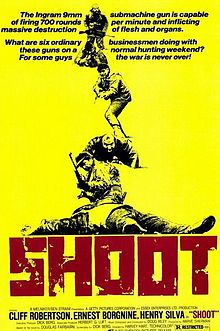 This would-be thriller wants very much to be a shocking expose of the dark underbelly of American machismo, and maybe it was back in 1976, but not today. It’s clumsy and uneventful, of interest solely as a musty product of its time.
This would-be thriller wants very much to be a shocking expose of the dark underbelly of American machismo, and maybe it was back in 1976, but not today. It’s clumsy and uneventful, of interest solely as a musty product of its time.
SHOOT joins quintessentially seventies fare like JOE (1970), DELIVERANCE (1972) and OPEN SEASON (1974) in its insistence that all men are animals and that under the surface of our inherent machismo is primitive bloodlust waiting to be unleashed. The 1973 Douglas Fairbairn novel SHOOT neatly sums up this attitude in its hardcover edition, which has the following sentence in lieu of a plot description: “There are those among us who have an aching need, deep down in their hearts, to inflict violent death.”
The 1976 film adaptation, directed by the veteran Canadian TV ace Harvey Hart (whose other credits include THE PYX and the notorious Harlan Ellison-scripted TV pilot THE STARLOST), has become quite obscure in recent years, and has inspired some bizarre speculations. According to one the name Douglas Fairbairn was a pseudonym for a CIA agent and that the plot of SHOOT was a thinly-veiled fictionalization of an actual incident involving American and Russian soldiers. Believe what you will, but I say the film is little-known because, simply, it isn’t very good.
Rex is an uber-macho hunter who together with four equally testosterone-addled buddies embarks on a hunting trip in the Canadian wilderness. But their weekend is cut short by a rival band of hunters they encounter in the forest, one of whom inexplicably take a potshot at Rex’s party and grazes the head of one of his buddies. Another of Rex’s friends returns fire, killing the shooter. From there Rex and company scurry off and head back to civilization.
Rex decides not to contact the authorities about the killing, betting the rival hunters will react the same way. To confirm this he looks up the murdered man’s identity and tracks down his widow. She reveals that her deceased hubbie’s buddies claim he was killed by a “stray bullet”. This doesn’t entirely satisfy Rex, however, who becomes convinced that the dead man’s companions are going to come after him and his friends. Rex makes plans to head back to the scene of the crime the following Saturday, where he’s positive the rival hunters will be waiting for them. He recruits a small army and a veritable arsenal of firepower as accompaniment.
The fateful day arrives. Rex and his mini-army, guns at the ready, set out into the now snow covered forest. It appears deserted. Appearances, however, can be deceiving, and before the day is done lots of guns—true to Rex’s predictions—will be fired.
From the start, director Harvey Hart’s filmmaking is less than promising: an early wide shot of the protagonists’ station wagon driving into the wilderness while their voices are heard on the soundtrack is blatantly lifted from the opening of DELIVERANCE. Plus the “action” is agonizingly slow moving, taking over fifteen minutes to arrive at the shooting that sets things in motion (whereas in the Fairbairn novel the event occurred in the opening paragraph). And then there’s the clumsy rapid cutting when the two hunting parties face one another, during which Hart tries to build suspense but ends up with nothing but annoyance.
From there the film bogs down even more, with endless scenes of the heroes bickering. There are facile debates on the finer points of machismo, gun control and infidelity, which nearly put me to sleep. Even the final confrontation, when the tension should be at its peak, is allowed to drag on interminably, culminating in a large scale shoot-out that likewise should be far more powerful than it is (its impact is lessened considerably by Hart’s unfortunate penchant for wide shots, which make it difficult to discern who’s shooting whom).
As for the actors, Cliff Robertson is stiff and unsympathetic in the lead role. Ernest Borgnine is better as his clear-eyed buddy who rightly questions the actions Robertson undertakes, but he’s given very little to do. In the novel his character played a vital role in the apocalyptic shoot-out, but here he remains offscreen for much of the climax.
Any positives? Well, the photography by Zale Magder has a tough, gritty hue—which makes it all the more obnoxious that Hart insists on punctuating it with a ludicrous funkadelic music score, which makes the subject matter feel even more archaic than it already does.
Vital Statistics
SHOOT
Essex Enterprises, Ltd.
Director: Harvey Hart
Producer: Harve Sherman
Screenplay: Richard Berg
(Based on a novel by Douglas Faribairn)
Cinematography: Zale Magder
Editing: Peter Shatalow, Ron Wiseman
Cast: Cliff Robertson, Ernest Borgnine, Henry Silva, James Blendick, Larry Reynolds, Leslie Carlson, Kate Reid, Helen Shaver, Gloria Carlin, Helena Hart, Peter Langley, Ed McNamara, Alan McRae
